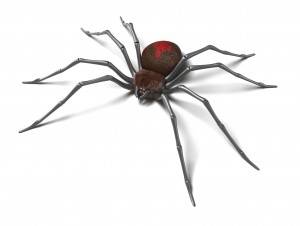Spiders Can Do More Than Spook This Halloween
From: Pet Poison Helpline
Halloween is a time for scary things — ghosts, snakes, cobwebs and oh, so many spiders. The toxicology experts at Pet Poison Helpline reviewed case data from multiple suspected black widow spider bites, and found that while many encounters were reported, diagnosing an actual bite can be difficult.
“Although severe reactions to black widow spider bites are relatively rare in humans, pets can be more adversely effected, especially cats,” said Dr. Renee Schmid, a senior veterinary toxicologist and director of Veterinary Medicine at Pet Poison Helpline. “With the thick hair most pets have, it is difficult to find an actual bite wound, and so your veterinarian often has to base the diagnosis on symptoms, rather than knowing an actual cause. This is not just limited to spider bites. Because our pets can’t tell us what’s wrong with them or how they feel, we often develop a treatment plan based on the symptoms we’re able to observe along with information regarding the pet’s environment and history rather than a confirmed diagnosis.”
One pet owner knew for sure that his cat Elsy had come in contact with an arachnid because she produced physical evidence.
“We recently received a call from a Reno-area pet owner who found a black widow spider in his kitten’s vomit,” Dr. Schmid said. “Fortunately, the spider’s body was intact, making it easy to identify, and it didn’t appear to have bitten his furry little friend before being eaten. If the kitten had been bit by the spider, it might have been a different outcome.”
Often, a pet is diagnosed as having been bitten by a spider when in fact their symptoms had another cause. Sometimes pet owners never really know what happened but are relieved that the pet is back to good health.
“My cat Ice Cream crawled under a shed in my yard, and when she came out, she was unsteady and was having difficulty breathing,” said John Ellsworth of Vancouver, Canada. “They initially thought she was bitten by a black widow spider, and started treatment. After further examination, however, they 100% ruled out a spider bite because they found a stinger in her throat. It was probably a hornet or bee.”
Spider venom can cause a host of reactions, including swelling, inflammation, pain, necrosis of the skin, bruising, vomiting, itchiness, fever, abnormal clotting and even organ failure. In severe reactions, the pet can die. Horses and cats are very susceptible to black widow venom and one bite can be detrimental.
“Although spiders are front and center during Halloween, they are a danger throughout the year,” Dr. Schmid explained. “Most people think that spiders disappear in cold locations, when in fact they go into a state known as overwintering. It is similar to when a bear hibernates. Your pets can still find them in barns, sheds and other hiding places, or even your home. If your pet comes in contact with a venomous spider, they can be in danger and you should contact your veterinarian or Pet Poison Helpline immediately.”
Short URL: http://caninechronicle.com/?p=307472
Comments are closed













